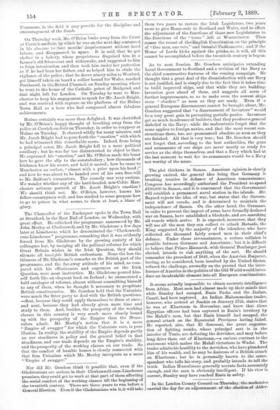The Chancellor of the Exchequer spoke in the Town Hall
_at Stratford, in the East End of London, on Wednesday, with great effect. He criticised the programme announced by Mr. John Morley at Clerkenwell, and by Mr. Gladstone a few days later at Limehouse, which he denominated the " Clerkenwell- cum-Limehouse " programme, remarking that it was evidently forced from Mr. Gladstone by the growing anxiety of his colleagues lest, by merging all the political reforms for which Great Britain wishes in the Irish Question, they should alienate all bona-fide British enthusiasm. None the less the thinness of Mr. Gladstone's remarks on the British part of the programme, and the far-away attitude of his mind, as com- pared with his effusiveness and eagerness on the Irish Question, were most instructive. Mr. Gladstone poured him- self forth like an eloquent book on Ireland ; he enumerated a bald catalogue of reforms, almost without committing himself to any of them, when he thought it necessary to propitiate .British constituencies. Mr. Goschen held that the Unionists were much the fitter, party to deal with the British questions, —first, because they could apply themselves to them at once ; and next, because they had already given more time and Andy to them. And, besides, the prosperity of the working classes in this country is very much more closely bound up with the prosperity of the 'Empire than the Home- rulers admit. Mr. Morley's notion that it is a mere "Empire of swagger" for which the Unionists care, is pure illusion. In reality, the stability of the Empire depends partly on our steadiness in policy and the , general belief in that steadiness, and our trade depends on the Empire's stability, and the prosperity of the working classes on our trade. So That the comfort of humble homes is closely connected with that firm Unionism which -Mr. Morley interprets as a mere "Empire of swagger."


































 Previous page
Previous page